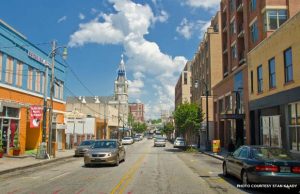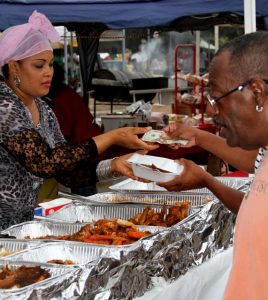In 2017, the Metro Atlanta area ranked number seven on the Kauffman Foundation’s 2017 Index for Startup Activity of best metropolitan areas for black-owned companies. According to the study, among the top 10 regions, Atlanta has the highest number of businesses per 100 inhabitants. This information is not a new development, Atlanta has been a hub for black-owned companies for years. The city’s growing black middle class, manageable cost of living, a vibrant HBCU culture, and a large number of black entrepreneurs and influencers has assisted in this designation. However, there is one area that is an iconic staple in the past, present, and future of Atlanta’s black business ecosystem.
A Storied History
The historic Sweet Auburn, a mile and a half stretch on Auburn Avenue within Atlanta has been the site of the city’s most influential innovations and institutions regarding the city’s black business history. The Sweet Auburn business district was established in the late 1800s, and it was the site of many notable business landmarks. The area’s reputation for black business ownership grew during the painful time of Jim Crow. As a result of segregation and restrictive zoning, many African Americans found themselves concentrated to specific areas of the city, and one of those places was the Sweet Auburn area.

The location was the site of the first black-owned newspaper, The Atlanta Daily World, the second largest black insurance company in the United States, Atlanta Life Insurance, and the first black-owned office building in the city, The Rucker Building. However, one of the main foundations of this area was the street’s numerous community-driven churches, Big Bethel AME, First Congregational, and the famous Ebenezer Baptist Church, the legendary location of Martin Luther King Jr.’s inspirational and world-changing ideas.
For almost 80 years, the business owners and inhabitants of this area flourished. However, the growth came to a halt in the 1960s. A highway project and lack of government funding sent the area into a prolonged period of decline. One by one, businesses closed their doors as crime and neglect caused the street to lay dormant. Sweet Auburn, once known as a bustling locale for black entrepreneurs, was declared as one of Atlanta’s most Historic Endangered Place in 1992.
A Resurgence Over 20 Years in the Making
During most of the 90s, challenging times were the norm for Sweet Auburn, but a glimmer of hope came in the form of a home and apartment rehabilitation project by The Historic District Development Corporation. The group restored 110 single-family homes and 50 rental units, a move forward for the historic street. However, there is another project that has led to the area’s resurgence and has acted as an unofficial incubator for the street. For 100 years, the Municipal Market (formerly known as the Sweet Auburn Curb Market) has stood in Sweet Auburn providing groceries and resources to downtown Atlanta residence.
While it has existed for the better part of a century, a 2010 stimulus grant of $1.8 million provided the location with a much-needed renovation. Since then, the market has been the site of many new black-owned businesses, a remarkable re-introduction to the city’s past.
Lotus Shanté-Chaney, CEO of Garden Glow Wellness and instructor at the Municipal Market’s The Learning Kitchen, discussed the impact the area has had on her business pursuits, “My very first public class was taught at The Learning Kitchen (previously Preserving Now), and it was a beautiful success. Garden Glow Wellness was just getting off the ground (I didn’t even have a bank account yet) and I was super nervous at first, but the market embraced me and helped make it great. Just being able to have an accessible space in Downtown ATL, to teach families affordable ways to eat and live healthier has been a major benefit to not only myself and my business but also to the community.”


Fortunately, Sweet Auburn’s re-development is allowing an increasing number of entrepreneurs to get their businesses off the ground. Jermail Shelton, half of the husband and wife team that owns Just Add Honey, a retail tea shop, had this to say about the area’s growing resurgence, “Over the last two years we’ve noticed more black-owned businesses moving into the market. Just over the last six months, we’ve had a black-owned book store, and gift shop move in along with a black-owned grocery store.”
Also, according to him, the area is resonating with consumers, “Sweet Auburn provided us with a huge platform of new customers. Every day, the market sees over 2,000 people walk through their doors.” The Municipal Market has become a site for other black-owned enterprises like Miss D’s Pralines, a dessert shop, Rawsome Juicery, a juice bar specializing in healthy ingredients, and Swet209, a nostalgic apparel shop.
An Innovative Future
From 2015 to 2017, the Sweet Auburn area has seen over $155 million in investment. The area is finally seeing the development it has desperately needed and deserved. Developments that include over 4,000 square feet of rental space and over 532,000 square feet of institutional space are in the works. One of the latest bright points for the area is its return to its entrepreneurial roots in the form of The Guild, an innovative co-living space. Located above the black-owned Atlanta Breakfast Club, the Guild seeks to provide entrepreneurs and changemakers with short-term rentals that expose them to community-building activities and opportunities for networking. Sweet Auburn is also the new home to HQ Auburn, a black-owned co-working location and business incubator. Both are two excellent efforts to help bring Sweet Auburn back to its roots of inclusion and business success.


From the Sweet Auburn Music Festival to the Municipal Market and city investments, Sweet Auburn is experiencing a long overdue resurgence. Many black entrepreneurs, inspired by the area’s historical influence on Atlanta’s black business scene, are bringing commerce back to the location. Shanté-Chaney reflected on this significance, “I think because of the steady growth in the city, the history of Sweet Auburn Market and the traffic to the area, those business owners were able to not only gain exposure but could also participate as black business owners in a historical black marketplace, which is monumental […] there are just so many success stories and I’m proud to have witnessed them firsthand.” As the years go on, and projects like The Guild, HQ Auburn, and the Municipal Market continue to expand, it is the hope that Sweet Auburn can once again represent what it once was.
Photo credit: Sweet Auburn Historic District © Atlanta CVB https://www.visittheusa.com/destination/atlanta
The Atlanta Small Business Network, from start-up to success, we are your go-to resource for small business news, information, resources.


While you’re here, don’t forget to subscribe to our email newsletter for all the latest business news know-how from Atlanta Small Business Network.







